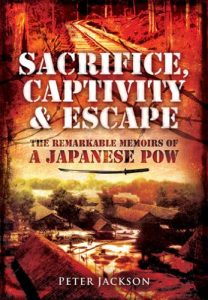Sacrifice, Captivity and Escape is an exceptional story. Peter Jackson was young and recently married when he was drafted into the army at the start of World War II. He had no wish to be there but like most of his generation he was given no choice.
Peter arrived in Singapore just as the city was being evacuated and within days he was a prisoner of the Imperial Japanese Army. Peter was one of the very few to survive the hardship, illnesses and brutality that followed. Like so many he was forced to work for the Japanese, first in Singapore and then on the infamous Thai-Burma railway. While there, remarkably, he escaped with seven other soldiers and, when recaptured, he was treated harshly.
His memoir brings alive the characters of his comrades and also of the Japanese who he encountered. Some of the Japanese treated their prisoners humanely and Peter was able to form a relationship with them but others were sadistic psychopaths.
But throughout his memoir there is a sense of hopefulness that, as young men, they would survive and get back to their homes; this was despite the despair many of them felt at losing four years of their lives as prisoners.
Peter arrived in Singapore just as the city was being evacuated and within days he was a prisoner of the Imperial Japanese Army. Peter was one of the very few to survive the hardship, illnesses and brutality that followed. Like so many he was forced to work for the Japanese, first in Singapore and then on the infamous Thai-Burma railway. While there, remarkably, he escaped with seven other soldiers and, when recaptured, he was treated harshly.
His memoir brings alive the characters of his comrades and also of the Japanese who he encountered. Some of the Japanese treated their prisoners humanely and Peter was able to form a relationship with them but others were sadistic psychopaths.
But throughout his memoir there is a sense of hopefulness that, as young men, they would survive and get back to their homes; this was despite the despair many of them felt at losing four years of their lives as prisoners.






